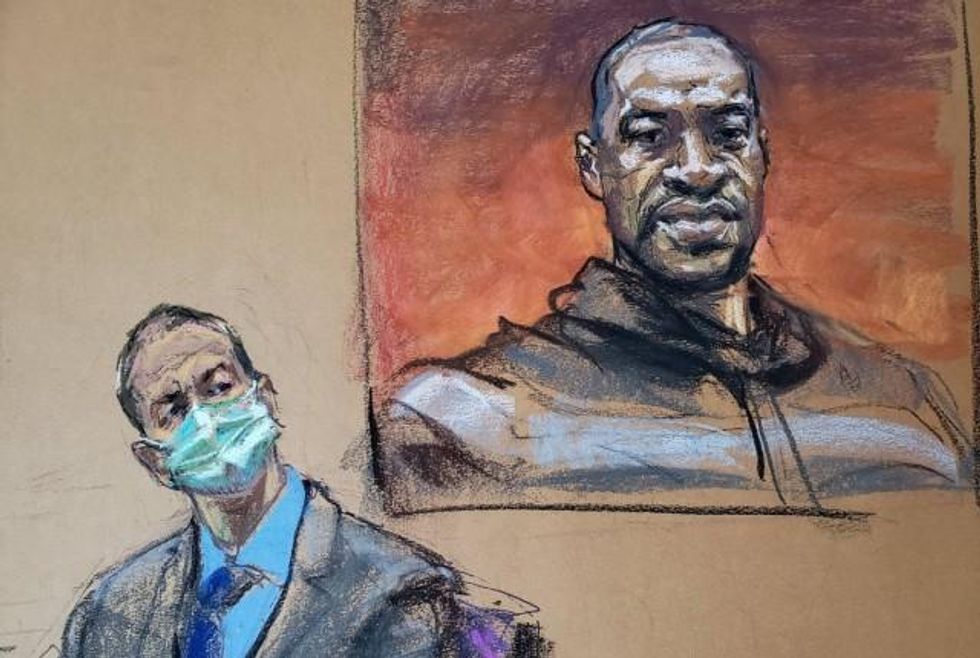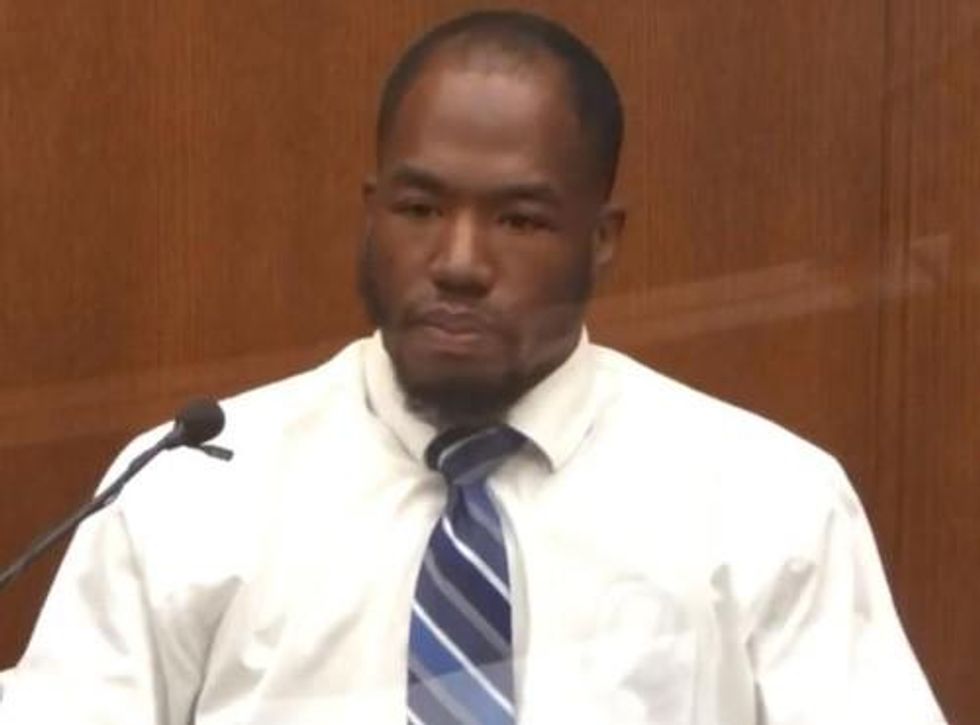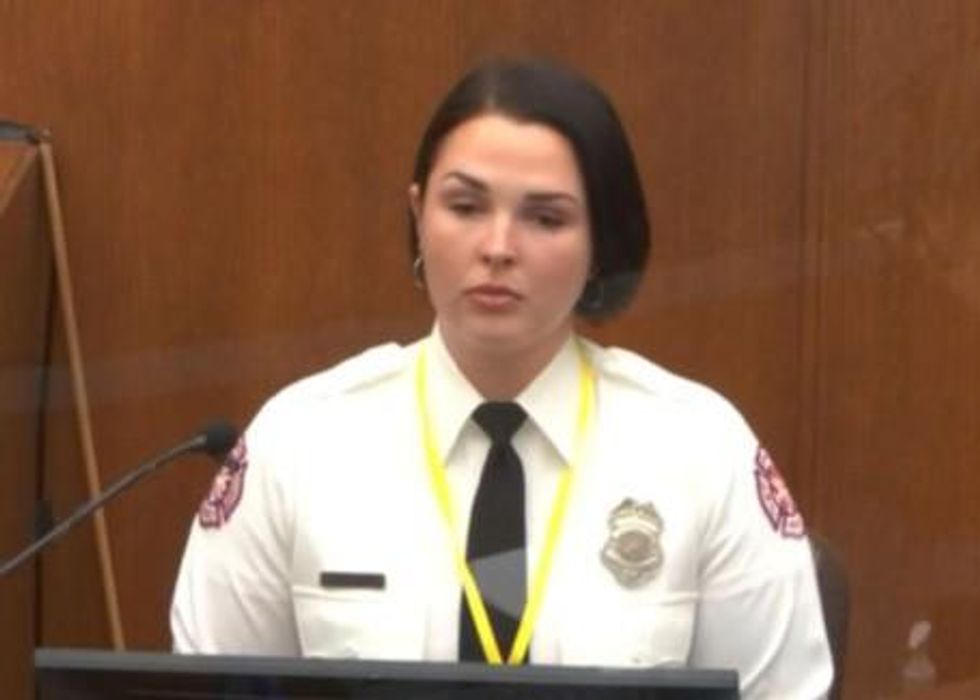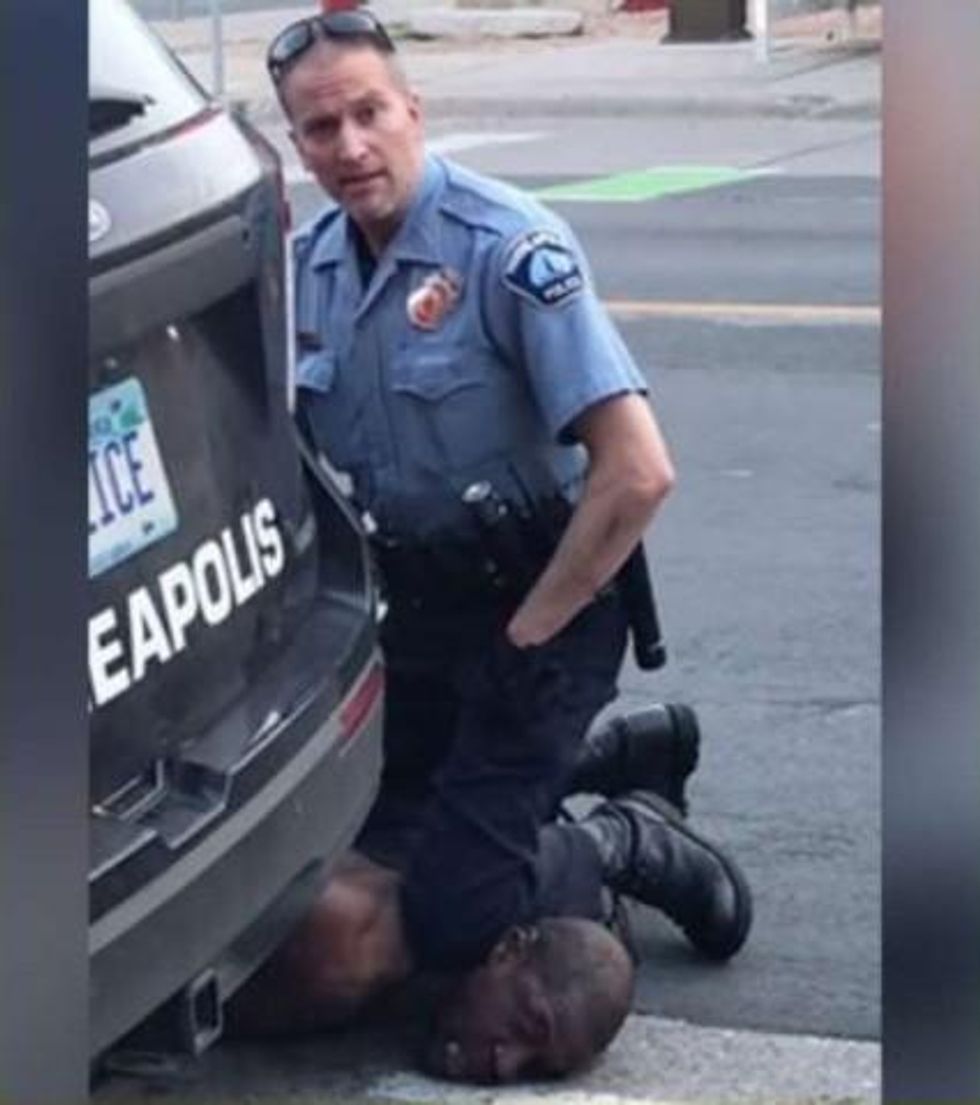

SUBSCRIBE TO OUR FREE NEWSLETTER
Daily news & progressive opinion—funded by the people, not the corporations—delivered straight to your inbox.
5
#000000
#FFFFFF
To donate by check, phone, or other method, see our More Ways to Give page.


Daily news & progressive opinion—funded by the people, not the corporations—delivered straight to your inbox.
The wrenching second day of Derek Chauvin's trial featured three formidable witnesses - a martial artist who "called the police on the police" when he saw a "blood choke" killing George Floyd, an off-duty firefighter who said she was "desperate to help," and the traumatized teen who filmed it. They all cried, they all rebutted fractious defense questions, they all said they saw a murder, and it was horrific. One observer: "Sadly, George Floyd died that day, but there were angels on the scene."

The wrenching second day of Derek Chauvin's trial featured three potent, unflappable eyewitnesses - a mixed martial artist who "called the police on the police" when he saw the "blood choke" killing George Floyd, an off-duty firefighter who said she was "desperate to help" but was rebuffed by the cops, and the traumatized teenager who took the infamous video with her cell phone. With stunning uniformity, they all cried, they all fought off fractious and often racist defense questions, they all affirmed, yes, they saw a murder, and it was horrific. During Monday's opening statements, prosecutors revealed a harrowing fact: Chauvin kept his knee on Floyd's neck, not for the 8 minutes and 46 seconds long believed, but for nine minutes and 29 seconds. "The most important numbers you will hear in this trial are nine two nine," prosecutor Jerry Blackwell told the jury. Then, he broke it down: 4 minutes and 45 seconds as Floyd cried for help, 53 seconds as he flailed from seizures, 3 minutes and 51 seconds as he lay unresponsive. After playing the video, Blackwell noted that, during those excruciating minutes, Chauvin "didn't let up" on Floyd, who pleaded 27 times that he couldn't breathe: "He put his knees upon his neck and his back, grinding and crushing him, until the very breath - no, ladies and gentlemen - until the very life was squeezed out of him." In response, defense attorney Eric Nelson feebly argued Chauvin's obscene use of force was "unattractive but necessary," and the "evidence is far greater than nine minutes and 29 seconds." His "evidence": Floyd's death was caused by almost everything but a uniformed psycopath slamming his knee on his neck for almost 10 minutes - hypertension, coronary disease, drugs and "adrenaline flowing through his body" - and an unruly crowd watching didn't help, and three cops "could not overcome the strength of Mr. Floyd," a scary, superhuman, black dude who was struggling with addiction and thus deserved to die.
The first powerful witness to puncture those lame racist tropes was Donald Williams, 33, a black martial arts teacher who's trained cops and a sometime bouncer who lives near the Cup Foods convenience store; when he came upon the scene of three cops on top of Floyd, he said, he was deeply disturbed but "as an MMA fighter, I tried to keep my discipline." Williams had already testified he saw Chauvin place Floyd in a "blood choke" that cuts off circulation to the brain; when he saw Chauvin do a "shimmy" to fatally increase pressure, he yelled repeatedly at him to stop. Chauvin stared at him "dead in the eyes," intent on proving that a white cop could do whatever the hell he wanted: "That's the only time he looked up." Williams painfully described Floyd ebbing: "You could see his eyes slowly, you know, rolling back up and in his head, and him having his mouth open, wide open...that he's trying to, you know, gasp for air." Finally, "You see Floyd fade away like the fish in the bag." By the time Floyd was loaded into an ambulance, he had no pulse. After they left, feeling "very lost" and that he had to "speak out for Floyd's life," Williams called 911 - "I did call the police on the police" - and said he "witnessed a murder." When prosecutors played back his call - "Officers just killed this guy that wasn't resisting arrest...He was already in handcuffs...Then he stopped breathing" - Williams got tearful. But when Eric Nelson tried to paint him as another scary black guy, he stood his ground. Was it true, Nelson asked, he called Chauvin "some mean names," including "a tough guy" and "a fucking bum"? "You heard the video," Williams said calmly. "I was watching a man get murdered. I said what I said, with no regret." Many praised Williams as "a righteous" witness offering unflappable testimony - "You can feel it in your bones and hear it in his voice" - but he turned out to be only the first of several. Noted one, "These witnesses are the fucking avengers."
Prosecutors then called Darnella Frazier, who recorded the video; just 18, only audio of her testimony was livestreamed. Frazier was taking her 9-year-old cousin Judeah Reynolds to the store; when she saw a man "and a cop kneeling down on him," she ushered Judeah, in a t-shirt that read "LOVE," inside. Floyd was "terrified, scared, begging for his life," she said, crying. "It wasn't right. He was suffering. He was in pain...He cried for his mom." She added, "I look at my dad, I look at my brothers, I look at my cousins...They are all Black...That could have been one of them." Her heartbreaking coda: "It has been nights I stayed up apologizing and apologizing to George Floyd for not doing more (and) not saving his life." Then, angrily: "Its not what I should have done - it's what he (staring at Chauvin) should have done." The day's final powerhouse witness was Genevieve Clara Hansen, a young, white, off-duty firefighter who came on the scene and was "desperate to help." She yelled at the cops to let her help or take Floyd's pulse; when they blocked her, she luckily began recording on her phone "because memories of witnesses are never going to as good as a video." In court, she was emotional but indomitable - "This woman's composure is astounding" - even when the judge WTF mansplained to her. Hansen carefully described the steps she would have taken to render aid; she swatted off Nelson's inept conjectures - "What if...?" "I know my job." "But what if an untrained person...?" "I'm trained, so no" - and banal innuendoes. Him: "Some people were swearing." Her, cold as ice: "I don't know if you've seen anybody be killed, but it's upsetting." Remarkably, once Floyd was taken away, Hansen stayed at the scene; she was worried about the safety of the black people still there with the cops. And like Williams, shaken by what she'd seen, she called the police on the police. "I literally just watched police officers not take a pulse and not do anything to save a man," she told 911. "I am a first responder myself, and I ...they fucking killed him." From one moved observer: "Sadly, George Floyd died that day, but there were angels on the scene."

The heroic Williams

The heroic Hansen

The psycopath Chauvin
Dear Common Dreams reader, The U.S. is on a fast track to authoritarianism like nothing I've ever seen. Meanwhile, corporate news outlets are utterly capitulating to Trump, twisting their coverage to avoid drawing his ire while lining up to stuff cash in his pockets. That's why I believe that Common Dreams is doing the best and most consequential reporting that we've ever done. Our small but mighty team is a progressive reporting powerhouse, covering the news every day that the corporate media never will. Our mission has always been simple: To inform. To inspire. And to ignite change for the common good. Now here's the key piece that I want all our readers to understand: None of this would be possible without your financial support. That's not just some fundraising cliche. It's the absolute and literal truth. We don't accept corporate advertising and never will. We don't have a paywall because we don't think people should be blocked from critical news based on their ability to pay. Everything we do is funded by the donations of readers like you. Will you donate now to help power the nonprofit, independent reporting of Common Dreams? Thank you for being a vital member of our community. Together, we can keep independent journalism alive when it’s needed most. - Craig Brown, Co-founder |

The wrenching second day of Derek Chauvin's trial featured three potent, unflappable eyewitnesses - a mixed martial artist who "called the police on the police" when he saw the "blood choke" killing George Floyd, an off-duty firefighter who said she was "desperate to help" but was rebuffed by the cops, and the traumatized teenager who took the infamous video with her cell phone. With stunning uniformity, they all cried, they all fought off fractious and often racist defense questions, they all affirmed, yes, they saw a murder, and it was horrific. During Monday's opening statements, prosecutors revealed a harrowing fact: Chauvin kept his knee on Floyd's neck, not for the 8 minutes and 46 seconds long believed, but for nine minutes and 29 seconds. "The most important numbers you will hear in this trial are nine two nine," prosecutor Jerry Blackwell told the jury. Then, he broke it down: 4 minutes and 45 seconds as Floyd cried for help, 53 seconds as he flailed from seizures, 3 minutes and 51 seconds as he lay unresponsive. After playing the video, Blackwell noted that, during those excruciating minutes, Chauvin "didn't let up" on Floyd, who pleaded 27 times that he couldn't breathe: "He put his knees upon his neck and his back, grinding and crushing him, until the very breath - no, ladies and gentlemen - until the very life was squeezed out of him." In response, defense attorney Eric Nelson feebly argued Chauvin's obscene use of force was "unattractive but necessary," and the "evidence is far greater than nine minutes and 29 seconds." His "evidence": Floyd's death was caused by almost everything but a uniformed psycopath slamming his knee on his neck for almost 10 minutes - hypertension, coronary disease, drugs and "adrenaline flowing through his body" - and an unruly crowd watching didn't help, and three cops "could not overcome the strength of Mr. Floyd," a scary, superhuman, black dude who was struggling with addiction and thus deserved to die.
The first powerful witness to puncture those lame racist tropes was Donald Williams, 33, a black martial arts teacher who's trained cops and a sometime bouncer who lives near the Cup Foods convenience store; when he came upon the scene of three cops on top of Floyd, he said, he was deeply disturbed but "as an MMA fighter, I tried to keep my discipline." Williams had already testified he saw Chauvin place Floyd in a "blood choke" that cuts off circulation to the brain; when he saw Chauvin do a "shimmy" to fatally increase pressure, he yelled repeatedly at him to stop. Chauvin stared at him "dead in the eyes," intent on proving that a white cop could do whatever the hell he wanted: "That's the only time he looked up." Williams painfully described Floyd ebbing: "You could see his eyes slowly, you know, rolling back up and in his head, and him having his mouth open, wide open...that he's trying to, you know, gasp for air." Finally, "You see Floyd fade away like the fish in the bag." By the time Floyd was loaded into an ambulance, he had no pulse. After they left, feeling "very lost" and that he had to "speak out for Floyd's life," Williams called 911 - "I did call the police on the police" - and said he "witnessed a murder." When prosecutors played back his call - "Officers just killed this guy that wasn't resisting arrest...He was already in handcuffs...Then he stopped breathing" - Williams got tearful. But when Eric Nelson tried to paint him as another scary black guy, he stood his ground. Was it true, Nelson asked, he called Chauvin "some mean names," including "a tough guy" and "a fucking bum"? "You heard the video," Williams said calmly. "I was watching a man get murdered. I said what I said, with no regret." Many praised Williams as "a righteous" witness offering unflappable testimony - "You can feel it in your bones and hear it in his voice" - but he turned out to be only the first of several. Noted one, "These witnesses are the fucking avengers."
Prosecutors then called Darnella Frazier, who recorded the video; just 18, only audio of her testimony was livestreamed. Frazier was taking her 9-year-old cousin Judeah Reynolds to the store; when she saw a man "and a cop kneeling down on him," she ushered Judeah, in a t-shirt that read "LOVE," inside. Floyd was "terrified, scared, begging for his life," she said, crying. "It wasn't right. He was suffering. He was in pain...He cried for his mom." She added, "I look at my dad, I look at my brothers, I look at my cousins...They are all Black...That could have been one of them." Her heartbreaking coda: "It has been nights I stayed up apologizing and apologizing to George Floyd for not doing more (and) not saving his life." Then, angrily: "Its not what I should have done - it's what he (staring at Chauvin) should have done." The day's final powerhouse witness was Genevieve Clara Hansen, a young, white, off-duty firefighter who came on the scene and was "desperate to help." She yelled at the cops to let her help or take Floyd's pulse; when they blocked her, she luckily began recording on her phone "because memories of witnesses are never going to as good as a video." In court, she was emotional but indomitable - "This woman's composure is astounding" - even when the judge WTF mansplained to her. Hansen carefully described the steps she would have taken to render aid; she swatted off Nelson's inept conjectures - "What if...?" "I know my job." "But what if an untrained person...?" "I'm trained, so no" - and banal innuendoes. Him: "Some people were swearing." Her, cold as ice: "I don't know if you've seen anybody be killed, but it's upsetting." Remarkably, once Floyd was taken away, Hansen stayed at the scene; she was worried about the safety of the black people still there with the cops. And like Williams, shaken by what she'd seen, she called the police on the police. "I literally just watched police officers not take a pulse and not do anything to save a man," she told 911. "I am a first responder myself, and I ...they fucking killed him." From one moved observer: "Sadly, George Floyd died that day, but there were angels on the scene."

The heroic Williams

The heroic Hansen

The psycopath Chauvin

The wrenching second day of Derek Chauvin's trial featured three potent, unflappable eyewitnesses - a mixed martial artist who "called the police on the police" when he saw the "blood choke" killing George Floyd, an off-duty firefighter who said she was "desperate to help" but was rebuffed by the cops, and the traumatized teenager who took the infamous video with her cell phone. With stunning uniformity, they all cried, they all fought off fractious and often racist defense questions, they all affirmed, yes, they saw a murder, and it was horrific. During Monday's opening statements, prosecutors revealed a harrowing fact: Chauvin kept his knee on Floyd's neck, not for the 8 minutes and 46 seconds long believed, but for nine minutes and 29 seconds. "The most important numbers you will hear in this trial are nine two nine," prosecutor Jerry Blackwell told the jury. Then, he broke it down: 4 minutes and 45 seconds as Floyd cried for help, 53 seconds as he flailed from seizures, 3 minutes and 51 seconds as he lay unresponsive. After playing the video, Blackwell noted that, during those excruciating minutes, Chauvin "didn't let up" on Floyd, who pleaded 27 times that he couldn't breathe: "He put his knees upon his neck and his back, grinding and crushing him, until the very breath - no, ladies and gentlemen - until the very life was squeezed out of him." In response, defense attorney Eric Nelson feebly argued Chauvin's obscene use of force was "unattractive but necessary," and the "evidence is far greater than nine minutes and 29 seconds." His "evidence": Floyd's death was caused by almost everything but a uniformed psycopath slamming his knee on his neck for almost 10 minutes - hypertension, coronary disease, drugs and "adrenaline flowing through his body" - and an unruly crowd watching didn't help, and three cops "could not overcome the strength of Mr. Floyd," a scary, superhuman, black dude who was struggling with addiction and thus deserved to die.
The first powerful witness to puncture those lame racist tropes was Donald Williams, 33, a black martial arts teacher who's trained cops and a sometime bouncer who lives near the Cup Foods convenience store; when he came upon the scene of three cops on top of Floyd, he said, he was deeply disturbed but "as an MMA fighter, I tried to keep my discipline." Williams had already testified he saw Chauvin place Floyd in a "blood choke" that cuts off circulation to the brain; when he saw Chauvin do a "shimmy" to fatally increase pressure, he yelled repeatedly at him to stop. Chauvin stared at him "dead in the eyes," intent on proving that a white cop could do whatever the hell he wanted: "That's the only time he looked up." Williams painfully described Floyd ebbing: "You could see his eyes slowly, you know, rolling back up and in his head, and him having his mouth open, wide open...that he's trying to, you know, gasp for air." Finally, "You see Floyd fade away like the fish in the bag." By the time Floyd was loaded into an ambulance, he had no pulse. After they left, feeling "very lost" and that he had to "speak out for Floyd's life," Williams called 911 - "I did call the police on the police" - and said he "witnessed a murder." When prosecutors played back his call - "Officers just killed this guy that wasn't resisting arrest...He was already in handcuffs...Then he stopped breathing" - Williams got tearful. But when Eric Nelson tried to paint him as another scary black guy, he stood his ground. Was it true, Nelson asked, he called Chauvin "some mean names," including "a tough guy" and "a fucking bum"? "You heard the video," Williams said calmly. "I was watching a man get murdered. I said what I said, with no regret." Many praised Williams as "a righteous" witness offering unflappable testimony - "You can feel it in your bones and hear it in his voice" - but he turned out to be only the first of several. Noted one, "These witnesses are the fucking avengers."
Prosecutors then called Darnella Frazier, who recorded the video; just 18, only audio of her testimony was livestreamed. Frazier was taking her 9-year-old cousin Judeah Reynolds to the store; when she saw a man "and a cop kneeling down on him," she ushered Judeah, in a t-shirt that read "LOVE," inside. Floyd was "terrified, scared, begging for his life," she said, crying. "It wasn't right. He was suffering. He was in pain...He cried for his mom." She added, "I look at my dad, I look at my brothers, I look at my cousins...They are all Black...That could have been one of them." Her heartbreaking coda: "It has been nights I stayed up apologizing and apologizing to George Floyd for not doing more (and) not saving his life." Then, angrily: "Its not what I should have done - it's what he (staring at Chauvin) should have done." The day's final powerhouse witness was Genevieve Clara Hansen, a young, white, off-duty firefighter who came on the scene and was "desperate to help." She yelled at the cops to let her help or take Floyd's pulse; when they blocked her, she luckily began recording on her phone "because memories of witnesses are never going to as good as a video." In court, she was emotional but indomitable - "This woman's composure is astounding" - even when the judge WTF mansplained to her. Hansen carefully described the steps she would have taken to render aid; she swatted off Nelson's inept conjectures - "What if...?" "I know my job." "But what if an untrained person...?" "I'm trained, so no" - and banal innuendoes. Him: "Some people were swearing." Her, cold as ice: "I don't know if you've seen anybody be killed, but it's upsetting." Remarkably, once Floyd was taken away, Hansen stayed at the scene; she was worried about the safety of the black people still there with the cops. And like Williams, shaken by what she'd seen, she called the police on the police. "I literally just watched police officers not take a pulse and not do anything to save a man," she told 911. "I am a first responder myself, and I ...they fucking killed him." From one moved observer: "Sadly, George Floyd died that day, but there were angels on the scene."

The heroic Williams

The heroic Hansen

The psycopath Chauvin